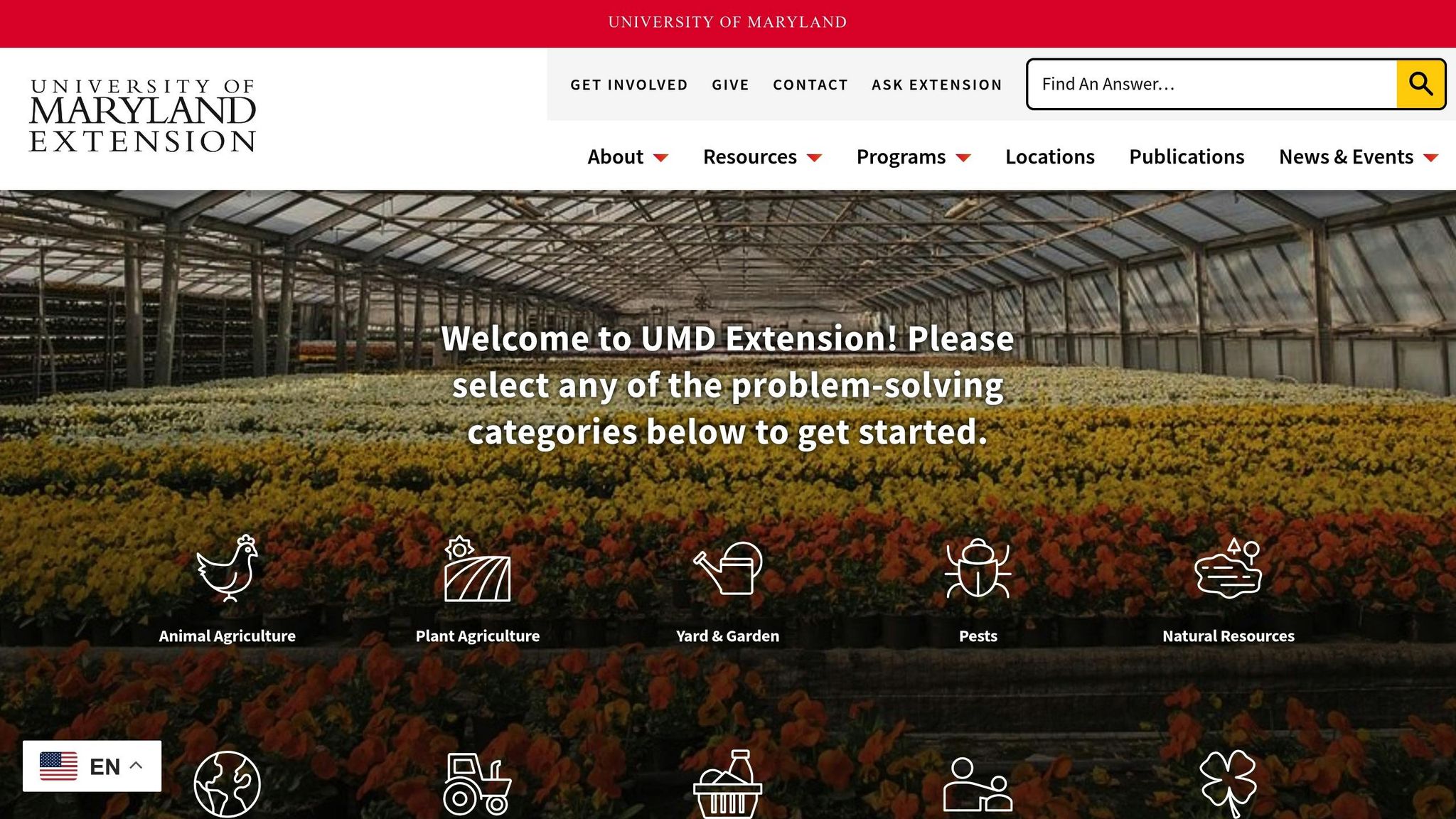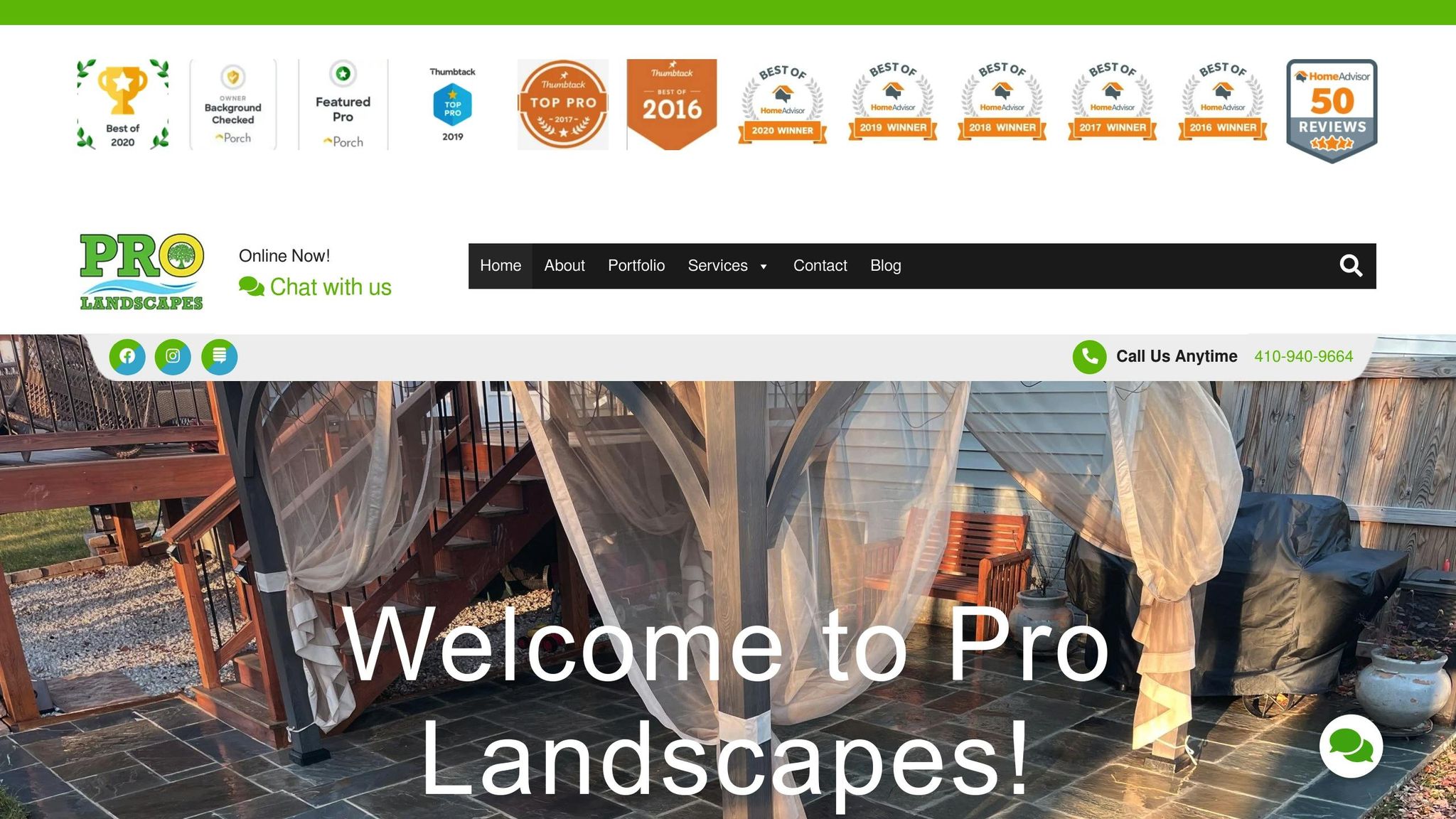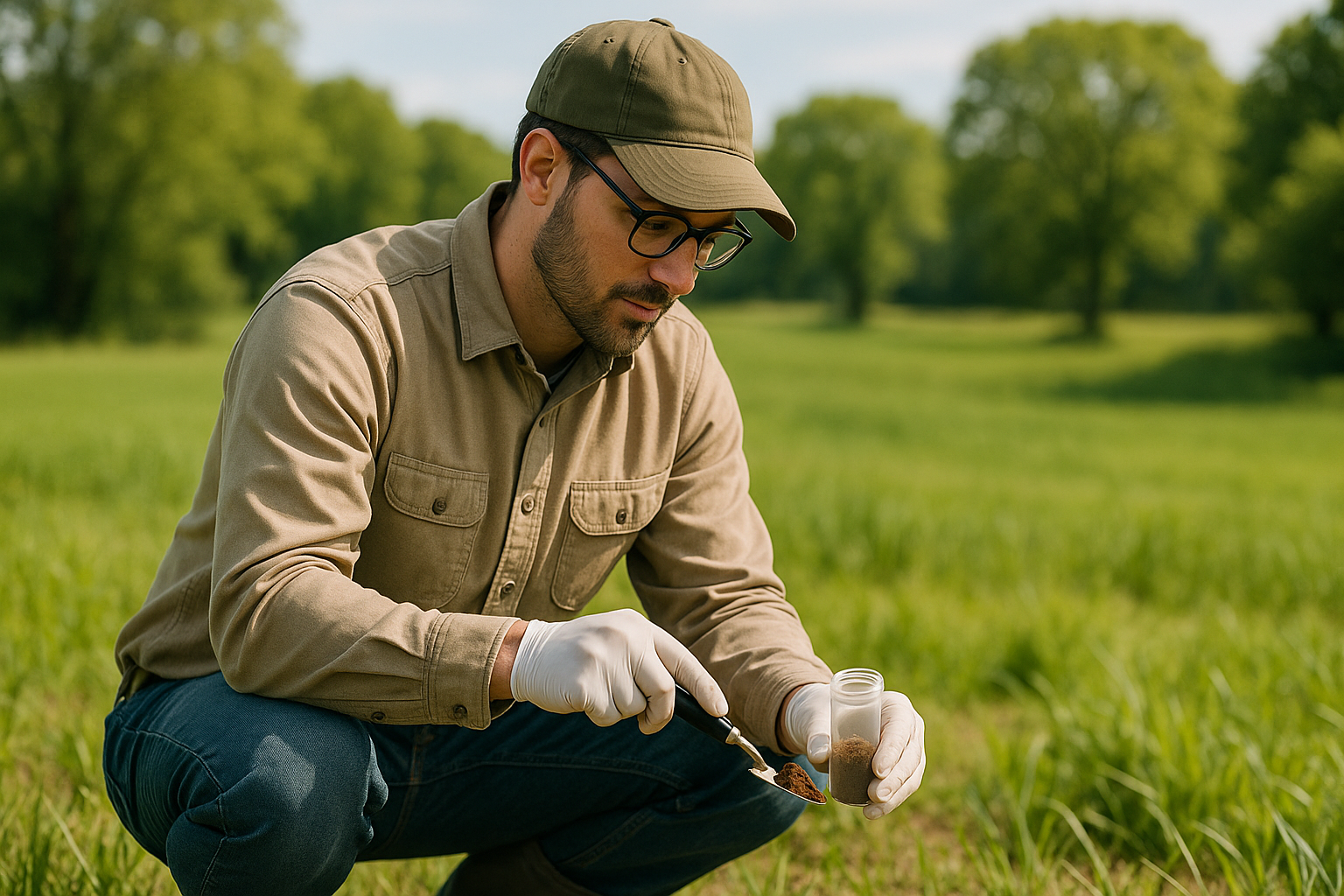- bhavya gada
- No Comments
Soil testing in Maryland is your first step to healthier lawns, gardens, and landscapes. It gives you precise data on soil pH, nutrient levels, and organic matter, helping you make informed decisions about fertilization and plant health. Here’s what you need to know:
- Why Test Your Soil?
Avoid wasting money on unnecessary fertilizers and prevent nutrient deficiencies. Testing every three years is recommended for most lawns and gardens. Costs range from $11 to $30. - Environmental Impact
Proper soil testing helps reduce nitrogen and phosphorus runoff, protecting Maryland’s waterways and the Chesapeake Bay from algae blooms and dead zones. - Types of Tests
- Basic: pH, nutrients, organic matter.
- Specialized: Trace elements (e.g., zinc, boron), contaminants (like lead), and soil texture.
- Agricultural: Tailored to crops with plant tissue analysis.
- Providers
- University of Maryland Extension: Offers guidance, certified lab lists, and sampling instructions.
- Private Labs: Provide quicker, detailed services with mail-in options.
Soil testing ensures your landscaping efforts succeed while safeguarding the environment. Whether you’re a homeowner or managing larger properties, it’s a small investment with big returns.
Types of Soil Testing Services in Maryland
Common Soil Testing Services
Soil testing services in Maryland are designed to meet a range of property needs and budgets. At the core of these services is basic soil analysis, which evaluates key factors like pH levels, nutrient content, and organic matter. This type of testing is perfect for homeowners looking to maintain healthy lawns, gardens, or landscaping.
For more targeted issues, specialized nutrient testing goes beyond the basics. While standard tests cover essential nutrients like phosphorus, potassium, calcium, and magnesium, specialized testing can detect deficiencies in trace elements such as boron, sulfur, copper, iron, manganese, zinc, and sodium [1][2]. This is especially useful for diagnosing stubborn problems in turf or ornamental plants that don’t respond to routine care [2].
If you’re concerned about safety, contaminant testing is a must – particularly for vegetable gardens or areas with a history of industrial use. Many labs include lead testing in their basic packages, and you can request additional checks for heavy metals like arsenic, cadmium, and chromium [1]. This type of testing is crucial for urban soils or properties with potential contamination risks.
For farmers or anyone managing larger-scale growing operations, agricultural and crop-specific testing provides detailed insights. Labs often recommend pairing soil samples with plant tissue samples from both healthy and problem areas. This combined approach offers a deeper understanding of nutrient deficiencies and overall soil health [3].
Other optional services include soluble salts testing and textural analysis, which examines the proportions of sand, silt, and clay in your soil [1][2]. These tests are particularly helpful for diagnosing drainage issues, compaction, or plant performance problems in specific areas. Together, these services provide a detailed assessment of your soil’s condition, helping you make informed decisions about its care.
What’s Included in a Soil Test
A standard soil test in Maryland provides a thorough snapshot of your soil’s current state and practical steps to improve it. Every test measures pH and buffer levels, which indicate whether your soil is too acidic or alkaline. Based on the results, recommendations are made for lime (to raise pH) or sulfur (to lower pH) applications [1][2][4].
The nutrient analysis focuses on essential elements like phosphorus, potassium, calcium, and magnesium. While nitrogen isn’t directly measured – because it fluctuates too quickly in the soil – labs do offer nitrogen recommendations tailored to your crops or plants [1].
Another key metric is organic matter content, which reveals the soil’s health and structure. Organic matter plays a critical role in water retention, nutrient availability, and fostering beneficial microorganisms. Soils with higher organic matter are generally healthier and require fewer additional inputs over time.
The results of these tests are translated into clear, actionable recommendations. Whether you’re maintaining a lawn, starting a vegetable garden, or planning new landscaping, the report will guide you on the right fertilizers, how much lime to apply, and the best timing for these treatments. This tailored advice ensures you’re making the most effective decisions for your property.
Most experts suggest testing your soil every three years for lawns and gardens, but problem areas may need more frequent checks [1][4].
Top Soil Testing Providers in Maryland
University of Maryland Extension

The University of Maryland Extension is a go-to resource for soil testing guidance across the state. They provide a comprehensive list of certified labs that meet Maryland’s agricultural and residential standards, ensuring reliable results. Alongside this, they offer detailed instructions on how to collect soil samples properly. Through local county offices and seasonal workshops, they also provide educational support, making it easier for property owners and gardeners to understand and improve their soil quality.
In addition to the resources from the University of Maryland Extension, private labs offer more tailored and convenient soil testing services.
Private Soil Testing Labs
Maryland is home to several well-regarded private laboratories that specialize in soil testing. These labs offer a variety of services, ranging from basic nutrient analysis to more detailed assessments. Many of them simplify the process by providing mail-in testing options, along with digital reports to help you save time and keep your projects on track.
When choosing a lab, consider factors like the type of test you need, how quickly you need results, and the overall convenience of the service. By leveraging the University of Maryland Extension’s statewide guidance and pairing it with the specialized testing services offered by private labs, you can gain a thorough and accurate understanding of your soil’s condition.
How to Choose the Right Soil Testing Service
What to Look for in a Provider
When selecting a soil testing service, it’s essential to prioritize one that delivers reliable results within a reasonable timeframe. Turnaround time can be a critical factor, especially if you’re working on time-sensitive landscaping or crop management projects. Typically, routine soil tests are completed within 2 to 10 business days, depending on the type of tests requested and the lab’s current workload [5][7][8]. Keep in mind that these timeframes refer specifically to business days.
If you’re facing an urgent situation, many labs provide expedited testing services for an extra fee. This can be particularly helpful when immediate action is needed to address plant health concerns [6][7]. By considering these aspects, you can choose a soil testing provider that aligns with your gardening or landscaping needs efficiently.
Soil Testing and Landscaping: The Role of Pro Landscapes MD

Why Soil Testing Matters for Landscaping
Every great landscape begins with understanding the soil beneath it. By analyzing soil composition, pH levels, and nutrients, landscapers can make informed decisions that prevent common issues like poor drainage or nutrient deficiencies – both of which can hinder plant growth.
Soil testing takes the guesswork out of landscaping. For instance, if a test reveals acidic soil with a pH below 6.0, professionals can select plants that naturally thrive in such conditions or recommend soil amendments to create a more balanced environment. This approach not only enhances the visual appeal of a landscape but also ensures its long-term health and sustainability.
In Maryland, where the soil varies from dense clay in inland areas to sandy textures near the Chesapeake Bay, understanding these regional differences is especially crucial. Pro Landscapes MD uses this knowledge to design landscapes that work in harmony with the natural environment, ensuring that each project is tailored to the unique characteristics of the area.
Pro Landscapes MD’s Landscaping Services
Pro Landscapes MD begins every project with a thorough soil evaluation, ensuring that plant and hardscape choices are perfectly aligned with the property’s conditions. Whether it’s selecting the right plants or planning a hardscaping project, their process is rooted in making the most of what the soil offers.
Their team of horticulture experts uses soil data to promote lush, healthy outdoor spaces. This includes everything from lawn care and planting to specialized garden and tree services, where understanding the soil is key to fostering strong root systems and lasting plant health.
For properties dealing with drainage issues, Pro Landscapes MD delivers solutions informed by soil assessments. Options like French drains, dry riverbeds, and stormwater management systems address water challenges while maintaining the integrity of the landscape. These strategies not only solve functional problems but also enhance the overall design.
With a commitment to eco-friendly practices, Pro Landscapes MD creates landscapes that thrive in their natural conditions, reducing the need for excessive fertilizers or chemical amendments. They serve communities across Howard, Montgomery, Carroll, Frederick, Prince George’s, and Baltimore Counties, including towns like Ellicott City, Gaithersburg, Columbia, and Bethesda. Their projects often start with a careful soil analysis, ensuring that every design – whether a restoration or a new installation – is built on a strong foundation.
This thoughtful approach highlights the critical role of soil in creating outdoor spaces that are both beautiful and enduring. By prioritizing soil health and local conditions, Pro Landscapes MD delivers landscapes that truly stand the test of time.
sbb-itb-843f8be
Soil Testing
Conclusion
Soil testing plays a critical role in creating sustainable and thriving landscapes across Maryland. It provides essential insights into soil composition, helping guide decisions about plant selection, drainage solutions, and overall landscape design. Whether you’re working with the dense clay soils found inland or the sandy soils near the Chesapeake Bay, understanding these unique characteristics is fundamental to achieving a successful landscape.
Maryland offers a range of soil testing services, from basic testing through the University of Maryland Extension to more detailed analyses available at private labs. These services cover everything from pH levels to nutrient availability and soil structure, equipping property owners with the knowledge needed to make smart landscaping choices.
By removing the guesswork, soil testing not only saves money but also ensures that landscapes are designed to thrive. This practical step supports better plant establishment, enhances drainage efficiency, and ultimately contributes to the overall health of your property.
At Pro Landscapes MD, soil evaluations are an integral part of every project. By tailoring plant selections, hardscape designs, and drainage solutions to the specific conditions of the soil, they create landscapes that flourish naturally. Their approach illustrates the value of professional expertise in designing outdoor spaces that align with the land’s inherent qualities.
Healthy soil is the foundation of any successful landscape. With Maryland’s diverse soil conditions, making informed decisions through precise soil testing is essential for creating outdoor spaces that are both sustainable and visually stunning. Whether you’re planning a small garden update or a large-scale transformation, starting with a soil test ensures your project is built for lasting success.
FAQs
How often should I test my soil to keep my lawn and garden healthy in Maryland?
To keep your lawn and garden thriving in Maryland, it’s a good idea to test your soil every 3 to 4 years. If you’re making frequent changes, like adjusting nutrients, using fertilizers, or tackling new landscaping projects, testing more often – every 1 to 3 years – can give you better insights.
For new planting or landscaping, try to test your soil a few months ahead. This gives you enough time to make any needed changes. Regular soil testing not only supports healthy plants but also helps prevent over-fertilizing, creating a greener and more balanced outdoor space.
How does soil testing benefit Maryland’s environment and protect the Chesapeake Bay?
The Importance of Soil Testing in Maryland
Soil testing is a key tool in protecting Maryland’s environment, especially the Chesapeake Bay. By measuring nutrient levels like phosphorus, it helps ensure fertilizers are applied responsibly. This prevents excess nutrients from washing into waterways, which can trigger algae blooms that harm water quality and disrupt aquatic life.
Beyond nutrient management, soil testing also helps combat sediment erosion and encourages better land use practices. These efforts are crucial for maintaining the health of Maryland’s ecosystems and preserving the Chesapeake Bay for the generations to come.
What should I consider when deciding between the University of Maryland Extension and private labs for soil testing?
The University of Maryland Extension no longer runs its own soil testing lab. However, they offer a handy list of recommended labs to help you find the right option. Many private labs go beyond basic testing, offering services like soil fertility analysis, contaminant checks, and overall health evaluations.
When choosing a lab, think about what you need from the test. Consider factors like the type of analysis required, the cost, how quickly you need results, and whether the lab provides detailed recommendations alongside their findings. Most private labs make the process straightforward by offering clear instructions and pricing, helping you select the best service for your specific needs.


















Chat with Us